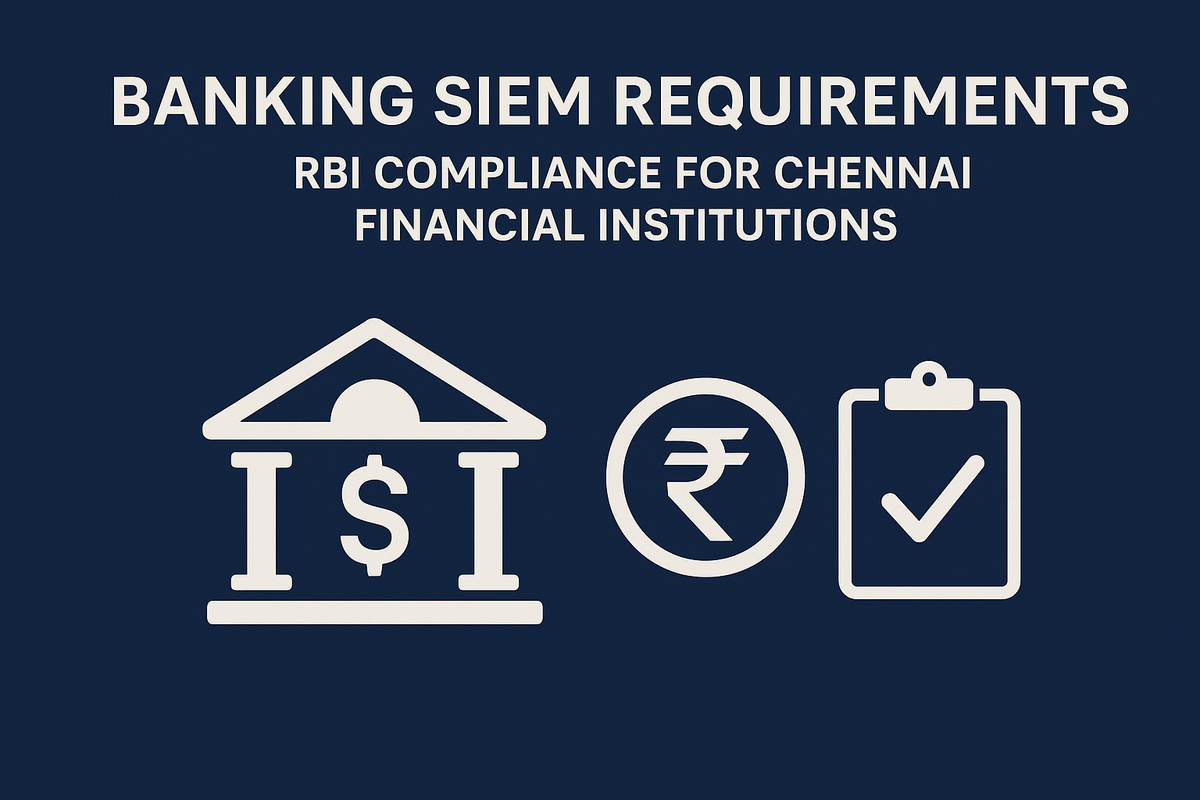Banking SIEM Requirements: RBI Compliance for Chennai Financial Institutions

Introduction
Cybersecurity has become a cornerstone of trust and stability in the banking and financial sectors, where sensitive customer data and high-value transactions are constantly at risk. In India, the Reserve Bank of India (RBI) plays a critical role in shaping cybersecurity compliance for banks and Non-Banking Financial Companies (NBFCs). As a major financial hub, Chennai hosts numerous banks and fintech companies that must adhere to RBI’s rigorous standards, making local compliance not just a regulatory requirement but a business necessity.
RBI Cybersecurity Framework Overview
The RBI has issued detailed guidelines to strengthen the cyber resilience of banks and NBFCs. These guidelines focus on protecting customer data, ensuring operational resilience, and managing risks proactively. They emphasize continuous risk assessment, vulnerability management, and the need for organizations to stay vigilant against evolving threats. Top management involvement is mandated, with the appointment of a Chief Information Security Officer (CISO) to oversee cybersecurity strategy and execution.
SIEM in Banking – RBI Requirements
Security Information and Event Management (SIEM) solutions play a pivotal role in meeting RBI’s cybersecurity requirements. They enable real-time monitoring, detection, and response to threats across complex banking environments. RBI mandates banks to maintain comprehensive audit logs, ensure event correlation, and detect incidents swiftly. SIEM must be integrated with privileged access management and other security tools to create a unified defense system. Beyond detection, SIEM also supports compliance reporting, forensic analysis, continuous surveillance, and anomaly detection, helping banks demonstrate adherence to RBI standards.
Access Control and Privileged Access Management
Managing privileged access is another core focus of RBI’s Master Directions. Banks must implement strict access controls using principles such as least privilege, role-based access, and multi-factor authentication. Audit trails for privileged accounts are mandatory, and monitoring tools must alert security teams about unauthorized access attempts. These measures help prevent insider threats and ensure accountability across sensitive systems.
Incident Response and Disaster Recovery
RBI requires banks to establish well-defined incident response teams, escalation protocols, and incident logging processes. Any significant security incidents must be reported to the RBI, with lessons learned documented to strengthen defenses. Disaster recovery planning and testing are equally important to ensure uninterrupted banking services even during major disruptions.
Security Testing and Audits
Banks are obligated to conduct regular Vulnerability Assessment and Penetration Testing (VAPT) at least quarterly, alongside periodic internal and external IT audits. These assessments align with RBI’s Risk-Based Internal Audit (RBIA) framework, which promotes continuous improvement of cybersecurity controls and preparedness.
Vendor and Third-Party Risk Management
Given the increasing reliance on third-party vendors and partners, RBI expects banks to perform thorough due diligence and include cybersecurity responsibilities in contractual agreements. Ongoing monitoring of vendor practices is essential to prevent external vulnerabilities from compromising critical banking operations.
Employee Awareness and Training
RBI emphasizes the importance of cultivating a security-aware culture within banks. Regular training sessions, phishing simulations, and awareness campaigns are essential for empowering employees to recognize and prevent cyber threats. Continuous education ensures that staff remain vigilant against evolving attack techniques.
Data Protection and Encryption
Data protection is central to RBI’s compliance framework. The regulator mandates data localization for certain types of customer information and enforces strong encryption for securing data both in transit and at rest. By adopting advanced encryption standards, banks can safeguard sensitive financial information and maintain customer trust.
Compliance Challenges and Consequences of Non-Compliance
Meeting RBI’s cybersecurity requirements can be challenging due to the complexity of financial systems, evolving cyber threats, and resource constraints. Non-compliance carries significant risks, including heavy financial penalties, legal consequences, and reputational damage. Several banks have faced penalties for failing to meet RBI standards, underscoring the importance of strict adherence.
Best Practices and Technology Adoption for RBI Compliance
To stay ahead, banks should deploy advanced SIEM solutions that incorporate AI-driven analytics for faster detection and response. Automation tools can streamline continuous monitoring and compliance audits, while data-centric security solutions provide granular control over sensitive information. A proactive approach to risk management and strong governance practices are essential to maintaining compliance and resilience.
Future Trends in RBI Compliance
The future of RBI compliance will likely bring stricter data privacy regulations aligned with global standards, increased emphasis on real-time threat detection, and advanced protections for cloud-based banking services. As digital payments and FinTech innovations grow, RBI is expected to introduce new guidelines tailored to these emerging technologies, further elevating security expectations.
Conclusion
For Chennai’s financial institutions, compliance with RBI’s cybersecurity and SIEM requirements is more than a regulatory checkbox—it is a critical component of safeguarding customer trust and ensuring operational continuity. By investing in mature SIEM solutions, robust access controls, and proactive risk management frameworks, banks can strengthen their defenses against evolving cyber threats. A holistic approach to cybersecurity and regulatory adherence not only meets RBI’s expectations but also positions banks for long-term success in an increasingly digital financial landscape
Take the Next Step with CodeSecure Solutions
Cyber threats are growing more sophisticated every day. With a trusted partner by your side, you can safeguard your business while focusing on what truly matters—growth and innovation.
At CodeSecure Solutions, we deliver comprehensive cybersecurity services in Chennai, uniquely tailored for startups, SMEs, and enterprises:
- Vulnerability Assessment & Penetration Testing (VAPT)
- Network Security Solutions
- Compliance Support (ISO 27001, PCI-DSS, HIPAA, DPDP Act, GDPR)
- Cloud & Endpoint Protection
- Security Awareness Training
No matter your industry or size, CodeSecure customizes solutions to fit your needs—ensuring your data, reputation, and operations remain secure.
Ready to Strengthen Your Defenses?
- 📞 Call: +91 73584 63582
- ✉️ Email: [email protected]
- 🌐 Visit: www.codesecure.in
Stay secure. Stay informed. Choose CodeSecure Solutions—your partner in cyber resilience.
